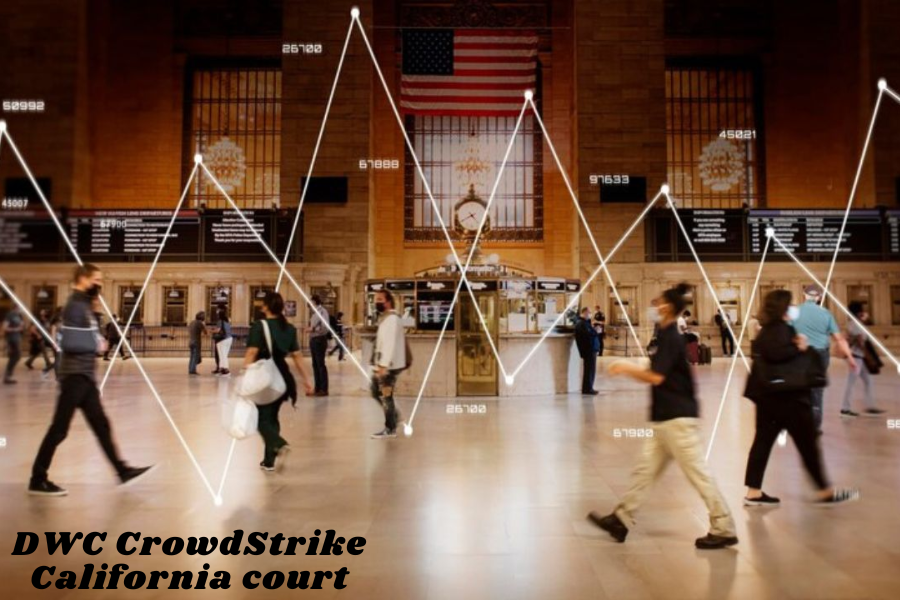In recent years, the intersection of technology and law has gained importance, especially concerning cybersecurity and corporate accountability. A significant case, the DWC CrowdStrike California court proceedings, has sparked vital discussions about digital privacy and the responsibilities of corporations in safeguarding sensitive information. As cyber threats evolve, the legal obligations of companies to protect data have come under scrutiny.
The DWC CrowdStrike California court case emphasizes the challenges businesses face in navigating data security and raises important questions about how they should safeguard customer information. This situation serves as a crucial moment in the conversation about corporate responsibility in the tech industry. Ultimately, the DWC CrowdStrike California court case could lead to new legal standards that hold companies accountable for protecting personal data, fostering a safer digital environment for consumers.
Understanding The DWC’s Role In The CrowdStrike Case

The Division of Workers’ Compensation (DWC) is a vital part of California’s Department of Industrial Relations. Its primary mission is to oversee the administration of workers’ compensation benefits, ensuring that injured workers receive fair treatment and appropriate support. By managing this system, the DWC seeks to balance the interests of employers, employees, and insurers, providing a structured framework for addressing workplace injuries and claims.
For a technology and cybersecurity company like CrowdStrike, navigating the legal landscape established by the DWC can be quite complex. As with any business that handles employee data, CrowdStrike must comply with stringent regulations regarding the protection and management of that information. The DWC plays an essential role in holding companies accountable to these standards, ensuring that they take necessary precautions to safeguard sensitive data.
The implications of the DWC’s involvement in the CrowdStrike case highlight the challenges that arise when cybersecurity concerns intersect with employment law. For organizations facing similar legal issues, understanding how the DWC operates within the framework of California law is crucial. CrowdStrike’s engagement with the DWC serves as a reminder of the importance of adhering to legal standards and navigating the intricate relationship between data security and workers’ rights.
The Significance Of Open Communication In Cybersecurity
Transparent communication is a crucial element in establishing trust and credibility within the cybersecurity industry. Especially during legal proceedings, clear and open communication can effectively manage stakeholder expectations and mitigate potential reputational risks. CrowdStrike’s approach to communication throughout its legal challenges provides valuable lessons for other companies navigating similar circumstances.
Effective communication starts with honesty and accountability. Organizations should keep stakeholders—such as employees, clients, and investors—informed with timely updates on the status of legal matters. By acknowledging challenges and clearly outlining the steps being taken to address them, companies can demonstrate their commitment to resolving issues openly and honestly.
Additionally, open communication should extend to regulators and authorities. Cybersecurity firms must cultivate cooperative relationships with regulatory bodies by proactively sharing relevant information and addressing any concerns that arise. This collaborative approach not only fosters goodwill but can also lead to more favorable outcomes in legal disputes, enhancing the firm’s reputation and reinforcing its commitment to compliance and ethical practices.
Context And Background Of The Case
The California Division of Workers’ Compensation (DWC) plays a crucial role in managing workers’ compensation claims, ensuring that injured workers receive the necessary benefits and support. In this context, CrowdStrike, a prominent cybersecurity firm recognized for its cutting-edge threat detection and response capabilities, was contracted by the DWC to help safeguard sensitive data against potential cyber threats.
However, tensions arose when the DWC accused CrowdStrike of not fulfilling certain contractual obligations regarding data security. The DWC claimed that CrowdStrike’s measures were insufficient to adequately protect sensitive information, putting the confidentiality of workers’ compensation data at risk. Conversely, CrowdStrike maintained that it had met all its contractual obligations and adhered to industry-leading cybersecurity practices. This dispute has not only brought attention to the specific terms of the contract but also raised significant issues about data protection standards and responsibilities in the cybersecurity landscape.
The Role Of CrowdStrike In The Cybersecurity Landscape

CrowdStrike has emerged as a leader in the cybersecurity field, recognized for its cutting-edge technology designed to detect, prevent, and respond to digital threats. Founded in 2011, the company has developed a robust reputation by offering cloud-based solutions powered by artificial intelligence (AI). CrowdStrike’s innovations have enabled countless organizations across various sectors, including healthcare and finance, to protect their digital assets from cyberattacks.
However, with its prominent status in the industry comes heightened scrutiny, particularly regarding legal matters. As CrowdStrike navigates its case with the Division of Workers’ Compensation (DWC), the company’s practices—especially those related to data security and employment policies—are being closely examined. This situation underscores the challenges that come with being a high-profile player in cybersecurity, where compliance with legal standards is just as critical as technological advancement. The outcome of this case could not only impact CrowdStrike but also set significant precedents for the cybersecurity industry as a whole.
Progress And Key Developments In The Court Case
As the DWC-CrowdStrike case unfolds in the California courts, several significant developments have captured public attention, shedding light on the complexities of legal arguments related to data protection and workers’ compensation claims.
Key Arguments from Both Sides
The plaintiffs in this case assert that CrowdStrike’s inadequate security measures directly contributed to the data breach, which compromised the personal information of employees. They argue that this negligence constitutes a violation of both workers’ compensation laws and cybersecurity regulations, asserting that the company failed to fulfill its responsibilities to protect sensitive data.
In contrast, CrowdStrike’s legal team argues that the company implemented reasonable precautions to safeguard employee data and that the breach resulted from sophisticated hacking techniques that could not have been anticipated or prevented. This defense highlights the difficulties in establishing liability in cases involving cybersecurity, where threats can be unpredictable and highly advanced.
Expert Testimonies and Evidence
As the trial continues, expert testimonies are proving crucial in shaping the court’s understanding of cybersecurity protocols and their effectiveness. Cybersecurity experts are being summoned to provide insights into industry standards for data protection and assess whether CrowdStrike’s security measures met those expectations.
The court is also reviewing evidence related to the breach, including the timeline of events and the response measures taken by CrowdStrike following the incident. This evidence will play a critical role in determining the case’s outcome and assessing whether the company’s actions were sufficient to mitigate the breach’s impact.
Major Legal Issues In The CrowdStrike Case
The ongoing legal proceedings involving CrowdStrike and the Division of Workers’ Compensation (DWC) highlight several key legal challenges that are essential to understanding the case’s implications. A major issue at stake is data privacy. As a leader in the cybersecurity industry, CrowdStrike is responsible for handling a significant amount of sensitive information, particularly related to its employees. The court is tasked with determining whether CrowdStrike’s practices align with California’s strict data protection laws, which emphasize the importance of safeguarding personal information.
Another important aspect of the case is the classification and treatment of employees and contractors. California has taken significant steps to redefine worker classifications, especially in response to the growth of the gig economy. The court is examining whether CrowdStrike has complied with state labor laws regarding the classification of workers and the obligations that come with these classifications. This issue is especially relevant in light of ongoing discussions about worker rights and protections in today’s economy.
Furthermore, this case raises broader questions about accountability and responsibility within the cybersecurity sector. CrowdStrike’s operational practices may set industry standards, and the court’s decisions could influence not only CrowdStrike but also other firms within the cybersecurity landscape. The outcomes of this case may have lasting effects on how companies manage data security and employee relations, ultimately shaping the legal framework governing these critical areas in the technology industry.
Key Takeaways For Cybersecurity Companies And Others

The legal battle between CrowdStrike and the Division of Workers’ Compensation (DWC) highlights several important lessons for companies, particularly those in the technology and cybersecurity sectors. First and foremost, the importance of compliance cannot be overstated. Staying updated with evolving regulations is crucial for avoiding costly legal disputes and maintaining trust with clients and stakeholders. Cybersecurity firms must prioritize understanding and adhering to the legal frameworks that govern their operations.
Another vital lesson is the necessity of transparency. Open communication with employees, clients, and regulatory bodies can significantly help organizations navigate challenges and build credibility. By fostering a culture of transparency, companies can better manage expectations and mitigate reputational risks. This openness not only helps in crisis management but also strengthens relationships with all stakeholders involved.
Lastly, proactive engagement with regulatory authorities is essential for companies aiming to stay ahead of potential legal issues. By collaborating closely with regulators, organizations can ensure that their practices align with legal standards, reducing the likelihood of disputes in the future. This proactive approach not only enhances compliance but also positions companies as responsible players in their industry, ultimately contributing to a more secure and trustworthy environment for all.
Conclusion
The DWC CrowdStrike California court case represents a significant legal dispute that underscores critical issues in cybersecurity, data protection, and labor laws. CrowdStrike, a leading cybersecurity firm known for its advanced threat detection technology, was contracted by the California Division of Workers’ Compensation (DWC) to safeguard sensitive data. However, the DWC has accused CrowdStrike of failing to meet its contractual obligations related to data security, claiming that inadequate measures led to a breach that compromised employee information. The case raises several legal challenges, including whether CrowdStrike’s practices comply with California’s stringent privacy regulations, how it interacts with employees and independent contractors under labor laws, and the company’s adherence to ethical and security protocols.
As the DWC CrowdStrike California court proceedings unfold, both sides present compelling arguments. The plaintiffs argue that CrowdStrike’s negligence violated workers’ compensation laws and cybersecurity regulations, while CrowdStrike contends that it took reasonable precautions and that the breach resulted from sophisticated hacking techniques. Expert testimonies are critical in assessing whether CrowdStrike’s security measures meet industry standards. Additionally, the DWC CrowdStrike California court case emphasizes the importance of transparent communication, as CrowdStrike aims to manage stakeholder expectations and mitigate reputational risks through open dialogue. The outcome of this case could set important precedents for data protection standards and accountability within the cybersecurity sector, making it a pivotal moment for the industry.
FAQs About DWC CrowdStrike California Court Case
1. What is the DWC-CrowdStrike case about?
The DWC-CrowdStrike case centers around a legal dispute between the California Division of Workers’ Compensation (DWC) and CrowdStrike, a leading cybersecurity firm. The DWC has accused CrowdStrike of failing to adequately protect sensitive employee data, which allegedly resulted in a data breach that compromised personal information.
2. What arguments are being presented by both sides?
The plaintiffs argue that CrowdStrike’s inadequate security measures directly led to the breach and constituted negligence under workers’ compensation and cybersecurity laws. In contrast, CrowdStrike’s defense claims that the company took reasonable precautions and that the breach was caused by sophisticated hacking techniques that were unforeseeable and could not have been prevented.
3. How is expert testimony impacting the case?
Expert testimonies are critical in helping the court understand the effectiveness of cybersecurity protocols and industry standards. Cybersecurity specialists are being called to evaluate whether CrowdStrike’s security measures met the required standards for data protection.
4. Why is transparent communication important in this case?
Transparent communication plays a vital role in managing stakeholder expectations and mitigating reputational risks. By keeping employees, clients, and regulatory bodies informed about the status of legal proceedings and their responses, CrowdStrike aims to foster trust and accountability, which can positively influence the outcome of the case.
5. What could be the implications of this case for the cybersecurity industry?
The outcome of the DWC-CrowdStrike case could set significant precedents for data protection standards and accountability within the cybersecurity sector. It may influence how companies manage their data security practices, comply with legal regulations, and engage with stakeholders, ultimately shaping the industry’s approach to cybersecurity and privacy issues.
Don’t miss the latest updates and alerts visit: Vents Fashion!

